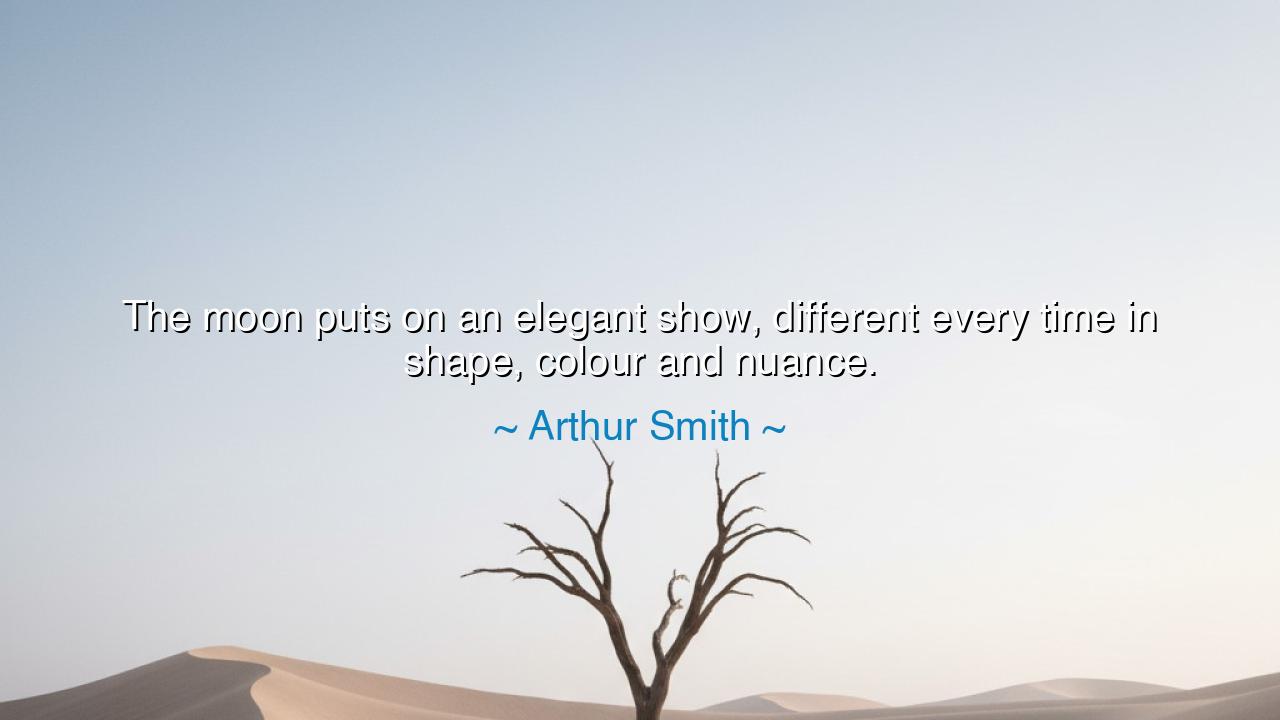
The moon puts on an elegant show, different every time in shape






The words of Arthur Smith, “The moon puts on an elegant show, different every time in shape, colour and nuance,” remind us that the heavens themselves are teachers, offering lessons of beauty, change, and constancy. To the hurried soul, the moon is but a light in the night sky. Yet to the watchful, it is a living poem, endlessly shifting, endlessly revealing itself anew. In its shapes, its soft colours, its delicate nuances, the moon whispers of the eternal rhythm of creation: that change is not a flaw but a form of beauty, that nothing is static, and that wonder is born from the dance of transformation.
At the heart of this quote lies the recognition that the moon is not only a celestial body but also a mirror of the human soul. Just as the moon never looks the same from one night to the next, so too does the inner life of man shift and change. We are not fixed beings but evolving stories, sometimes bright, sometimes hidden, sometimes whole, sometimes in shadow. To see the moon’s elegance is to remember that even in our imperfections and transitions, we, too, can shine with grace.
Throughout history, the moon has been revered as a symbol of cycles, mystery, and renewal. Ancient farmers planted by its phases, poets wrote of its glow, lovers swore oaths beneath its light. Consider the ancient Greeks, who saw in the moon the goddess Selene, driving her silver chariot across the sky. Or the Japanese haiku masters, who found in the shifting moon a source of endless inspiration for their delicate verses. In each culture, the moon’s ever-changing form was not seen as weakness, but as wonder. Arthur Smith’s words carry this same wisdom into our time, reminding us that its beauty lies in its variability, not in permanence.
One story that illustrates this truth comes from the life of Galileo Galilei, who in 1609 turned his telescope toward the moon. What had long been thought a perfect, flawless orb was revealed to have mountains, craters, and rugged terrain. To some, this discovery was shocking—it destroyed the illusion of celestial perfection. Yet to others, it revealed a deeper truth: that beauty can exist with roughness, that elegance can include irregularity. The moon was not diminished by its imperfections; it was made more real, more wondrous.
Thus, the teaching of this quote extends beyond the heavens to the conduct of life itself. Too often, we strive for permanence, for unchanging certainty, for a perfection that is smooth and unbroken. Yet the moon teaches otherwise: elegance is found in change, in subtle shifts of color and tone, in the quiet acceptance of shadow as part of light. To resist change is to resist the very fabric of existence. To embrace it is to find beauty in every stage, whether waxing or waning.
To the seeker of wisdom, let this be a guide: when you gaze upon the moon, remember that your own life, too, has phases. There will be nights when you are radiant and whole, nights when you are a mere sliver, nights when you are hidden entirely. Yet in each stage, there is still nuance, still meaning, still the potential for elegance. Your worth is not lessened by change; it is revealed by it.
The practical action is simple yet profound: cultivate a habit of watching the moon. Let it remind you to embrace impermanence with grace. When life shifts unexpectedly, think of the moon’s transformations and remember that beauty does not vanish with change—it only alters its form. Allow yourself to grow, to wane, to renew, just as the moon does in its ancient rhythm.
Thus, let Arthur Smith’s words endure as a teaching: the moon is not only an ornament in the night sky, but a wise elder, showing us that beauty is found in change, that elegance lies in diversity of form, and that life itself, in all its shifting shapes and colors, is a show worth beholding with awe. May we learn from the moon not to fear transformation, but to let every stage of our existence shine in its own quiet brilliance.






AAdministratorAdministrator
Welcome, honored guests. Please leave a comment, we will respond soon